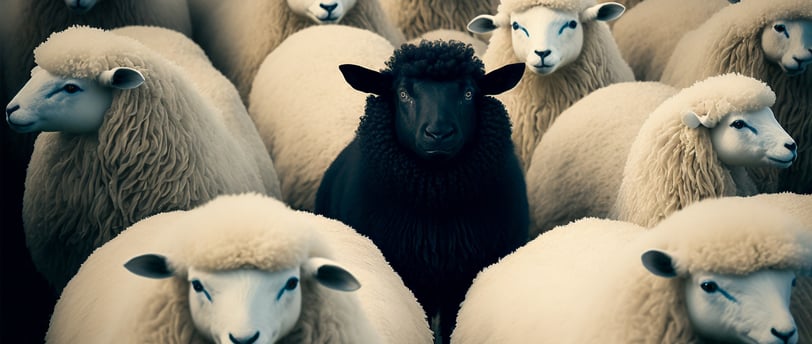Navigating the Pain of Being the "Black Sheep": Overcoming Hurtful Statements from Loved Ones
BLACK SHEEP
3/16/20242 min read


Common Hurtful Statements Made by Loved Ones to Black Sheep
Being labeled as the black sheep within a family can be painful and isolating. Unfortunately, loved ones may often make hurtful statements that further exacerbate these feelings. Here are five common hurtful statements made by loved ones to black sheep:
1. "You're such a disappointment."
When a loved one says this, it can feel like a direct attack on your worth and value. Remember that their perception of disappointment is subjective and does not define your true worth. Respond by affirming your own self-worth and reminding yourself of your accomplishments and strengths.
2. "Why can't you be more like your siblings?"
Comparisons to siblings can be incredibly hurtful and can make you feel inadequate. It's important to remember that everyone is unique and has their own strengths and weaknesses. Respond by embracing your individuality and focusing on your own personal growth and achievements.
3. "You'll never amount to anything."
These words can be crushing and demoralizing. It's important to recognize that this statement is a reflection of the other person's limited perspective and not a true reflection of your potential. Respond by setting goals for yourself and working towards them, proving to yourself that you are capable of achieving great things.
4. "You're the problem in this family."
Blaming you for family issues is unfair and unjust. Remember that family dynamics are complex and multifaceted, and it's not solely your responsibility to fix everything. Respond by setting boundaries and prioritizing your own well-being, focusing on building healthy relationships outside of your family if necessary.
5. "We don't want anything to do with you."
Being rejected by loved ones can be incredibly painful. It's important to remember that your worth and value do not depend on their acceptance. Respond by surrounding yourself with supportive friends and creating your own chosen family who appreciate and value you for who you are.
Restorative Responses and Coping Strategies for Black Sheep
While it can be difficult to navigate the ongoing trauma exposure caused by the hurtful statements of loved ones, there are strategies that can help lessen the effects. Here are five coping strategies that black sheep can implement on their own:
1. Seek support from others.
Reach out to friends, support groups, or therapists who can provide a safe space for you to express your feelings and validate your experiences. Surrounding yourself with a supportive network can help counteract the negative impact of hurtful statements.
2. Practice self-care.
Engage in activities that bring you joy and help you relax. Take care of your physical and mental well-being by prioritizing sleep, exercise, and healthy eating. Self-care is essential in maintaining resilience and coping with ongoing trauma exposure.
3. Challenge negative self-talk.
Replace self-critical thoughts with positive and affirming ones. Remind yourself of your worth and value, focusing on your strengths and accomplishments. Reframing negative self-talk can help build resilience and self-confidence.
4. Set boundaries.
Establish clear boundaries with loved ones who consistently make hurtful statements. Communicate your needs and expectations, and be prepared to enforce those boundaries if they are not respected. Prioritize your own well-being and protect yourself from ongoing emotional harm.
5. Seek professional help if needed.
If the ongoing trauma exposure becomes overwhelming and affects your daily functioning, consider seeking professional help from a therapist or counselor. They can provide guidance, support, and coping strategies specific to your situation.
Remember, being labeled as the black sheep does not define your worth or value as a person. Surround yourself with supportive individuals who appreciate and value you for who you are, and prioritize your own well-being above the hurtful opinions of others.
Contact
Please send an inquiry using the contact form and you should hear back within 3-5 days.
Existing clients, feel free to text/call me.


Artesha Williams, LCSW
All Copyrights Reserved.
